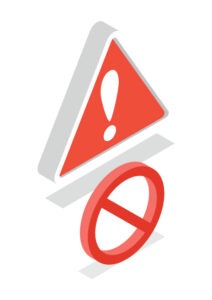What Should I Do if My Data Is Compromised on a Hacked Site?

Hackers find their way past the cybersecurity of companies all too often Yet most people don’t understand what actions they should take when this occurs on a site they use. Still, others don’t think the sites they use regularly could ever be breached. Here are some companies you might use:
- Adobe (2011, 2013): 380 million records
- Yahoo! (2013-2016): 3 billion records
- Dropbox (2016): 68 million records
- Equifax (2017): 147.9 million records
- Marriott International (2018): 500 million records
- T-Mobile (2021): 76.6 million records
- Facebook (2021) 533 million records
- LinkedIn (2016, 2021): 117 million records
- Twitter (2022): 500 million records
- Under Armour (2023): 300 million records
Have You Been Pwned?
 In cybersecurity, the term “pwned” indicates that a user’s personal data, such as passwords, email addresses, or other sensitive information, has been compromised in a data breach. The word “pwned” is a derivative of “owned,” meaning that someone has gained unauthorized access or control over an account or system.
In cybersecurity, the term “pwned” indicates that a user’s personal data, such as passwords, email addresses, or other sensitive information, has been compromised in a data breach. The word “pwned” is a derivative of “owned,” meaning that someone has gained unauthorized access or control over an account or system.
When a user’s data is pwned, their information has been stolen and may be used for malicious purposes such as identity theft, fraud, or financial scams. Hackers can use stolen passwords to access other accounts that include email, social media, or bank accounts. They can also sell stolen data on the dark web, which can be used for criminal activities.
To check if your data has been pwned, you can use a website called Have I Been Pwned? (HIBP) at https://haveibeenpwned.com/. This website is a free resource that lets users enter their email addresses and see if their data has been compromised in known data breaches. HIBP has a database of billions of compromised records from various data breaches.
What To Do if You Have Been
If your data has been pwned, taking immediate action to protect your accounts is crucial. You should change your password(s) for any compromised sites and all your online accounts that use that same password. This may also be a good time to consider changing your passwords for important online resources, especially those you use for financial or personal information. It would help if you also considered using a password manager to generate and store strong, unique passwords for all of your accounts.
Here are some additional tips for protecting your data from being pwned:
- Use strong, unique passwords for all of your online accounts. Avoid using easily guessable passwords, such as your name, birthday, or common words.
- Never reuse passwords across multiple accounts. If one account is compromised, all of your accounts could be at risk.
- Be careful about clicking on links in emails or messages. Hackers often use phishing emails to trick people into revealing their personal information.
- Install security software on your computer and keep it up to date. This will help protect you from malware and other online threats.
- Be aware of the latest data breaches and take steps to protect yourself. Follow reputable security news sources and sign up for breach notifications from HIBP and other websites.
Sagacent Technologies Can Help You Avoid This
Learn more about how Sagacent can help you solve your cybersecurity problems with a free security assessment.

